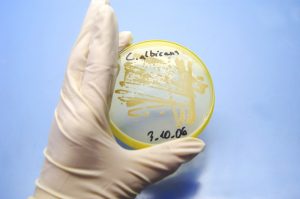 Petri disc with Candida alcicans culture had of scientist holding to evaluate the growth
Petri disc with Candida alcicans culture had of scientist holding to evaluate the growth
Jessica was recently diagnosed with IBD in January of 2018. We started nystatin to kill excess yeast as this is what we thought was the root cause, the doctor thought the same thing we think. So, the question for me was should I let her eat rice in the form of rice cakes, rice crackers and/or beans and what diet should she be eating. She did not have typical symptoms of IBD like bloody diarrhea, vomiting, loss of weight. Recently she ate two scrambled eggs and 24 hours later started vomiting and got a fever of about 101 for two days. She also after eating a steady diet of rice crackers and rice cakes had diarrhea for a week.
If we were strictly doing an anti-candida diet like I followed from the The Candida Diet book by Ann Boroch, you would only eat brown rice once a week but beans are permitted anytime and I assume in any amounts. For some reason I was inspired to look up what the SCD diet book Breaking the Vicious Cycle by Elaine Gottschall had to say. This diet which I had thought about following and did follow for 2 months prior to pregnancy I found extremely difficult to do. “The starches in all grains, corn, and potatoes must be strictly avoided.” Pg. 27 from book.
As I was doing some research on IBD one website said that “This chart review suggests that the SCD and other low complex carbohydrate diets may be possible therapeutic options for pediatric Crohn disease.” https://www.ncbi.nlm.nih.gov/pubmed/24048168. Another article by Dr. Ronald Hoffman entitled Restricting carbohydrate consumption helps children with Crohn’s and ulcerative colitis said, “From a clinical perspective, I have found the SCD an indispensable tool in the management of patients with IBD…key findings of their study said, There were no adverse events reported; however, 2 patients dropped out of the study due to difficulty maintaining the diet. At the 2-week follow-up visit, 5 of the 12 patients were in clinical remission. Eight of the remaining 11 patients achieved remission at 8 weeks, and 8 of 10 remained in remission at 12 weeks. Therapy was ineffective for 2 of the patients who maintained the diet for the full 12 weeks.” https://www.naturalmedicinejournal.com/journal/2017-03/specific-carbohydrate-diet-inflammatory-bowel-disease
While Jessica muscle tested fine to eat rice in the form of cakes or crackers and beans, being able to eat 1 cup daily of each, she has not been doing well on it. I know the difficulty of this diet but yesterday she asked for rice crackers and I explained to her that we couldn’t eat them now so she could get her body healed and she accepted that and ate the meat and fruit I offered her. We have so much to do and learn still but deciding on a diet and what to eat has been very difficult. The only thing we have to base any suspicion or concern about IBD is Jessica’s lactoferrin levels were high. An article from NIH entitled Fecal lactoferrin is a sensitive and specific marker in identifying intestinal inflammation said, “Fecal lactoferrin is sensitive and specific for detecting inflammation in chronic IBD. This noninvasive test may prove useful in screening for inflammation in patients presenting with abdominal pain and diarrhea.” https://www.ncbi.nlm.nih.gov/pubmed/12818275/ Since she reacted so badly to eggs and a steady diet of rice we have seen the limitations of muscle testing and blood levels of IgE to eggs going down.
If you read this post and believe in prayer please pray for us because we need a lot of it. If you have any other ideas about diets for IBD or experience with it yourself I’d love to hear your story. Please share below so we can all benefit from your experience.
Thank you